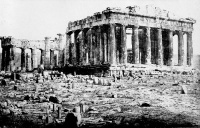Greek language
From The Art and Popular Culture Encyclopedia
|
"The earliest poems of Greece supplied the Greeks with their earliest themes for study, for exegesis, and for Homer and literary criticism. From about 600 b.c. we have rhapsodes definite proof of the recitation of the Homeric poems by rhapsodes in many parts of the Greek world."--A History of Classical Scholarship (1906-1910) by John Sandys "For instance, Sanskrit, so-called Old Persian and Zend, Greek, Latin, Gothic, Lithuanian and Old Slavic, are certainly not sufficient to enable us to arrive at an exact comprehension of the original relations of the structure of the Indo- European tongues. The original Germanic form of speech, derived from the manifold variety of all the German dialects, must take the place of Gothic, and, in a similar manner, the other factors of what has hitherto passed as Indo-Germanic comparative grammar must be replaced, if the linguistic life of this race is to appear to us in its true light."--On the Origin of Language (1867) by Wilhelm Bleek |
|
Related e |
|
Featured: |
Greek is an Indo-European language with a documented history of 3,500 years, the longest of any single language in that language family.
Ancient Greek includes the forms of the Greek language used in ancient Greece and the ancient world from around 1500 BC to 300 BC. It is often roughly divided into the following periods.
Ancient Greek was the language of Homer and of fifth-century Athenian historians, playwrights, and philosophers. It has contributed many words to English vocabulary and has been a standard subject of study in educational institutions of the Western world since the Renaissance. This article primarily contains information about the Epic and Classical periods of the language.
From the Hellenistic period, Ancient Greek was followed by Koine Greek, which is regarded as a separate historical stage, although its earliest form closely resembles Attic Greek and its latest form approaches Medieval Greek. There were several regional dialects of Ancient Greek, of which Attic Greek developed into Koine.
See also
- Greek
- Greek alphabet
- Greek literature
- Greek language question
- Greek substrate language
- Language
- List of Greek words with English derivatives
- That's Greek to me (expression)


